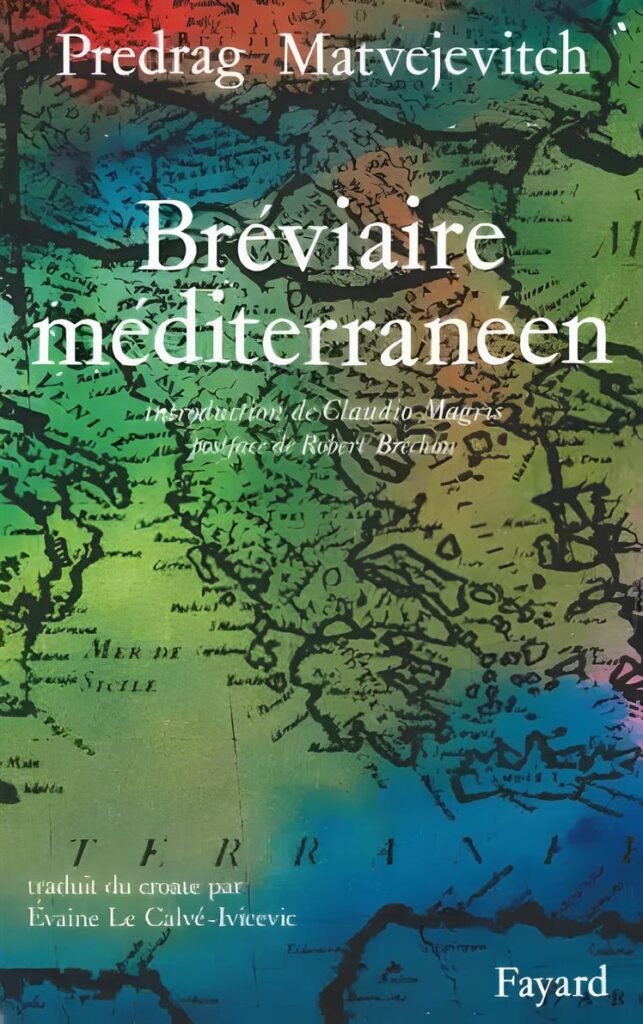Those who love the Mediterranean are invariably drawn to the work of Predrag Matvejevitch! A singular character, with a Russian father and a Croatian mother, he was deeply attached to Mostar, to that old bridge that connects the two banks of a world that was his. Unfortunately, this bridge was destroyed during the war in the former Yugoslavia, and Predrag became orphaned from this "ex-world" that he so aptly described, as an inspired professor, a passionate scholar, and an intellectual engaged against all identity nationalisms. Predrag's work on the Mediterranean is a meteorite, coming from the Balkans, that tells of a world that became his, through his many wanderings in this middle of the world.
There are crossings after which our gaze changes and those where our past itself transforms: they open or conclude the stories of the Mediterranean.
Let us keep this epigraph for our "Mediterranean in stories"...
His "Mediterranean Breviary" has become one of those essential books that continues to accompany you over time. It is picked up and put down, leafed through and whispered, listened to and recounted in as many assembled fragments as it alone holds the secret.
Indeed, here is a singular work that has become essential for discovering and understanding the Mediterranean world, inviting us to take a step aside, like in one of his other major books, "The Other Venice," which received the Strega Prize in 2003, one of the highest literary distinctions in Italy. He has the art of showing us what is hidden in the obviousness of unnoticed things.
Wandering between his native Croatia, France, his adopted literary homeland, and Italy, where he taught at the University of Sapienza in Rome, Matvejevitch is one of the very few writers who has managed to create and sustain a bridge between Mittel-Europe and the Mediterranean. A mediator between worlds, a lover of bread, which he made one of his last great books, Matvejevitch is much more than a simple travel companion; he was a friend, an ally, a lover of the sensitive world in the Mediterranean, which he managed to share like no one else before him.
Here begins a work that is nothing overwhelming; it is rather a Breviary that, more than a prayer, invites us to enter a true garden of delights!
The Mediterranean Breviary, of which here is a short excerpt, to read and reread...
One cannot explain what drives us to attempt, again and again, to reconstruct the Mediterranean mosaic, to once again draw up the catalog of its components, to verify the meaning of each taken separately or the value of some in relation to others: Europe, the Maghreb and the Levant; Judaism, Christianity, and Islam; the Talmud, the Bible, and the Quran; Athens and Rome; Jerusalem, Alexandria, and Constantinople; Venice and Genoa; the dialectic, democracy, and Greek art; the republic, law, and Roman forum; ancient Arab science; the Provençal and Catalan poetry of yore; the Renaissance in Italy; Spain at various exalted and cruel times; the South Slavs on the Adriatic, and many other things besides. By highlighting or dissociating the stronger or predominant components, usually presented in their binary or ternary relations, we run the risk of reducing or distorting the scope or content of the Mediterranean. Here, peoples and races have united and disunited for centuries, coming closer or confronting each other perhaps more intensely than elsewhere: one falls into exaggeration when trying to bring out their similarities and reciprocities, to the detriment of their differences and conflicts. The Mediterranean is not just a story.
The Mediterranean particularities do not easily integrate into other sets; they do not fit into all the relationships that the sea maintains with the continent, the south with the north, the east or west with the south. There are many contradictions that marked the civilizations, both ancient and modern, of the Mediterranean shores: after Greece and Rome, Byzantium, Italy, France with Provence, Spain and Catalonia, the Arabs from the Maghreb to the Levant, Spain and Dalmatia and Pannonia, Slovenia from the coast to the Alps, Serbia with Montenegro, Macedonia and Bulgaria, Albania, Romania, Turkey, and undoubtedly others, before or after the Greco-Roman era and in relation to it, jointly or separately. The cultures of the Mediterranean are not solely national cultures.
The Mediterranean does not tolerate overly narrow measures. It is to betray it to consider it from the perspective of Eurocentrism, as a purely Latin, Roman, or Roman product, to observe it from the viewpoint of pan-Hellenism, pan-Arabism, or Zionism, to judge it according to this or that ethnic, religious, or political particularism. Often, its image has been distorted by fanatical tribunes and biased exegetes, scholars without conviction and preachers without faith, official chroniclers and opportunistic poets. States and Churches, monarchs and prelates, secular and religious legislators worked to divide space and people. But the internal ties resisted the divisions. The Mediterranean is more than a simple belonging.
The discourse on the Mediterranean has suffered from Mediterranean eloquence: sun and sea; scents and colors; winds and waves; sandy beaches and islands of happiness; young girls quickly matured; widows dressed in black; ports, boats, and invitations to travel; navigations, shipwrecks, and the stories that accompany them; orange, myrtle, and olive; palms, pines, and cypress; splendor and misery, reality and dreams; life and dream. Such are the motifs from which the clichés of literature have excessively drawn: descriptions and repetitions. Mediterranean rhetoric served democracy and demagoguery, freedom and tyranny. It seized the forum and the temple, justice and preaching. The arena echoed beyond the Areopagus. The Mediterranean and its discourse are inseparable.

Photo of the Day: The Bridge of Mostar ©Hans Hansen - Pixabay
